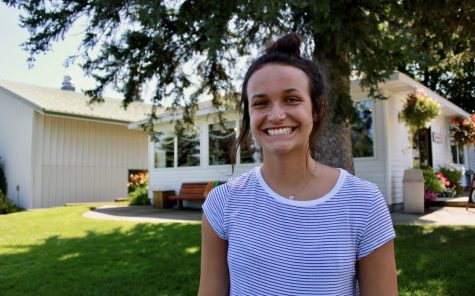Athletes reap benefits of playing multiple sports
Coaches, trainer cite advantages for athletes
Senior Haven Montefalco plays at a home basketball game against Arsenal Technical. Cathedral won 59-44.
From the athletics director, to the trainer, to top-notch coaches, each had the same answer: “The data is there.”
The Indiana High School Athletic Association has always pushed for student athletes to play multiple sports during their high school career. But recently, it has been more evident in the IHSAA broadcasts and livestreams displaying ads in the benefits of playing more than one sport.
Cathedral’s best agree, too. Athletic Director Mr. Rick Streiff, who coached Irish varsity football for 23 years over two tenures and is Indiana’s all-time coaching leader in State championships, is a firm believer in this philosophy.
He wrote in a email, “It is statistically proven that multi-sport athletes have lower risk of injury.”
Like Streiff, trainer Mr. Mike Hunker, said, “There is actually a lot of data out there showing that kids who play more than sport are less likely to get injured. If you are doing the same thing over and over, it’s almost like you are using the same muscles, the same joints in an assembly line. It causes overuse. On the other hand, multi-sport athletes are getting that variety in using different parts of your body. Physically, one sport will grind you down.”
Seniors Bo Sanders and Haven Montefalco have reached success in two sports each.
Sanders, an Elon commit, and Montefalco, a Harvard commit, share the football field.
They excel just as much as apart. Sanders was a member of the baseball team in its State tournament run, where the Irish finished as State runner-up last year. Montefalco leads the varsity basketball team in offensive rebounds.
The two agree that playing multiple sports has kept them in shape year round. It has developed their skills, both mentally and physically, and the different environments switch up their routines.
Football Head Coach Mr. Bill Peebles ‘88 said, “Last year in the NFL draft, 91 percent of draftees played multiple sports in high school.”
There’s a reoccurring trend here.
Like the rest, Ms. Jean Kesterson, former volleyball coach and American Volleyball Coaches Association Hall of Fame inductee, said, “A higher percent of injury comes with specialization. Across the board at every level, it shows.
“I’ve been coaching for a long time, but these kids are typically more athletic, their movement skills are better, their balance, their coordination, their mindset. It’s usually more advanced or at least different, bringing new perspective to our team.”
The hard evidence is all there. But besides the physical standpoint, Hunker added, “Even mentally, it’s limiting. Switching sport seasons brings a different attitude and acts as a reset button for athletes. I encourage it, yet I do understand how some see specialization to play one sport year round may be seen as getting ahead.”
Peebles also mentioned his view of specialization.
Peebles said, “I think that if you decide to play one sport because you love it and other sports don’t interest you, I think there is nothing wrong with that. But if you enjoy multiple sports, you should play multiple sports.”
Streiff said, “It gives the chance to be coached by different people who can bring out different positive characteristics in each athlete. Besides all this, why not play and have fun with your friends in as many different environments as possible?”
One varsity athlete who did exactly that is sophomore Caroline Cline.
With three varsity letters and a State ring between soccer and basketball, she said, “My favorite part is the girls. These relationships I’ll keep for a lifetime.”

Maddie Wirth is a senior. Her position at the Megaphone is a reporter. She is involved in the Philanthropy Mission Team, Student Council, and Broadcasting....







